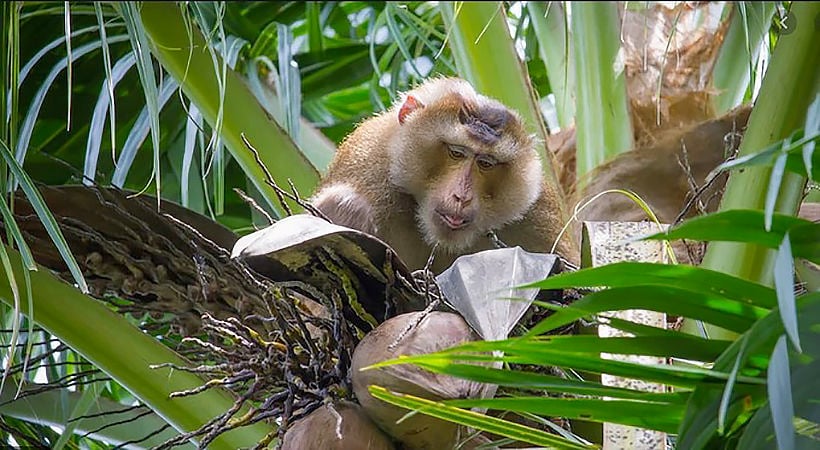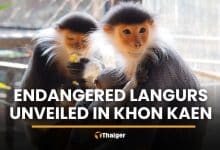Government defends “monkey business” after PETA call for boycott on Thai coconut products

People for the Ethical Treatment of Animals, the US-based animal rights group, is no stranger to controversy and has been accused of double standards in the past. Now it faces accusations of “cultural racism” after its open call to ban all Thai coconut products because some of the coconuts may have been harvested by monkeys. In a statement issued this morning…
“PETA hopes that at today’s meeting, Thai Minister of Commerce Jurin Laksanawisit and the coconut industry will stop lying to the public and acknowledge the industry’s exploitation of monkeys. Our documentation is clear and unequivocal: Monkeys are kept chained, caged, and isolated for life simply because the industry won’t expend funds to mechanise coconut picking as other countries have done.
“These animals, some of whom were seized from their natural habitat as babies, cannot play or be with their families: They are denied freedom and any semblance of a natural life, and the industry’s training methods are harsh and psychologically damaging. Forcing monkeys to pick coconuts must be relegated to the history books, and now is the time for the government and the coconut industry in Thailand to realize that using and abusing monkeys is no longer an option.”
But in a Facebook post today, the secretary-general of the Kla Party asked about the difference between using monkeys to pick coconuts in Thailand and the use of pigs to search for truffles in Europe. He said that the use of monkeys and pigs are two different cultures and both are respectable, and that in Thailand, monkeys and men work together to pick coconuts, with the animals properly trained at special schools. In the West, he said, pigs have been used for generations to find truffles, an expensive delicacy.
“PETA’s concern over animal cruelty is understandable, but its campaign for countries to ban coconut products from Thailand is cruel and an insult to our culture. Nowadays, one should respect racial and cultural diversity.”
TV celebrity Narakorn Tiyanont is calling on PETA to look at the way Western farmers raise geese to make foie gras, or goose liver, a delicacy in French cuisine. She says the geese are force-fed using metal tubes to fatten the liver. She also cited the brutal treatment of cows in the dairy industry.
A Former Prachuap Khiri Khan MP candidate says the accusation of monkey abuse might have an ulterior motive to ban Thai products…
“In the past, Thai rice farmers used water buffaloes in paddy fields and foreigners never banned Thai rice.”
In a statement to Thai PBS World, PETA senior vice president Jason Baker confirmed their findings of cruel treatment of monkeys in the harvesting of coconuts in Thailand.
“When the government tries to explain away extreme cruelty to monkeys, it only makes the public angrier. The world doesn’t want to see these animals being deprived of their natural lives and exploited by the coconut industry. The government can lead the industry to operate humanely, with an animal-free method, which the rest of the region has already adopted, or it can be responsible for the industry’s downfall, because the writing is on the wall.”
“Increasing numbers of consumers are speaking with their wallets, and retailers are listening. Our investigator was told repeatedly that these monkeys are taken from their families in nature, kept chained-up, abusively trained and forced to climb trees. They should be with their families, not enslaved.”
SOURCE: Thai PBS World | Chiang Mai One
Latest Thailand News
Follow The Thaiger on Google News:


























